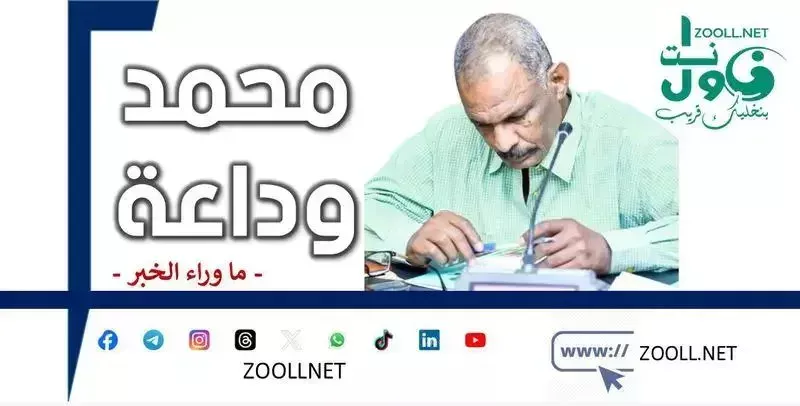Hamdok… neither dates from the Levant nor grapes from Yemen – beyond the news – ✍️ Muhammad Wadaa

*Africa Intelligence: Hamdok's unilateral actions cause headaches for the Taqaddum coalition*
*Political forces: The Nairobi Agreement is a gift from those who do not have it to those who do not deserve it*
*Political forces: Nairobi Accord issues are not a bilateral issue and their place is the Constitutional Conference*
*Hamdok conducted secret contacts with the forces and movements of the Democratic Bloc and other forces*
*Western circles: Hamdok is no longer suitable and is not capable of uniting civilian forces*
In a report from Africa Intelligence magazine, it is reported that “a few days before the holding of a major conference in Addis Ababa, the former Sudanese Prime Minister and leader of the Civil Alliance (Taqadum) faces growing criticism, internal and western. “, on his own initiative and without prior consultation, Hamdok signed on May 18 in Nairobi, a declaration to resolve the conflict in Sudan with the leaders of the two armed movements, Abdel Al-Wahid Nour and Abdel Aziz Al-Helou, declaration specifically recognizes the right to self-determination and the separation of religion from state, which are issues close to the hearts of both leaders, and this document was at the heart of the discussions that took place during the May 22 meeting .
In the ranks of Taqadum, the signing of this document caused great concern and highlighted a certain number of divisions. On the one hand, the supporters of a united Sudan, like Al-Siddiq Al-Mahdi of the Umma party, Omar Al-Dagir of the party. the Sudanese Congress Party, or Babakir Faisal of the Federal Assembly, criticize Hamdok for giving in to the issue of separatists' self-determination. These regions include the states of Southern Kordofan, Blue Nile (Abdul Aziz al-Hilu) and Darfur (Abdul Wahid Nour), on the other hand, members of the Taqadum who maintain close ties with the Rapid Support Forces (the one of the two main parties to the conflict) believe that these constitute the first step towards a possible secession of Darfur,
Since mid-April, a battle has pitted the Rapid Support Forces and the Sudanese armed forces against each other to capture El Fasher, the capital of Darfur. A possible RSF victory could accelerate the partition of Sudan, but the declaration signed in Nairobi should not be discussed at the Addis Ababa conference. It will likely be brought up before the meeting, and then again afterwards, so that it can be amended. In recent weeks, several Western embassies have distanced themselves from Hamdok due to his ties to the United Arab Emirates (where he resides), which has already done so. was accused of arming the Rapid Support Forces, and has… Close ties with many Taqadum leaders,
Former Sudanese Prime Minister and leader of the Alliance for Civil Progress, Abdalla Hamdok, was on shaky ground when he arrived in Addis Ababa on the evening of May 22. Some Taqaddam leaders wanted to hear him explain his latest incoherent position behind closed doors, which made Washington and Brussels believe that he is not, or no longer, the ideal partner to unify the civil front. appointed in February as U.S. special envoy to Sudan, he was enthusiastic. Diplomat Tom Perriello has decided not to appear in public with Hamdok, and because of his ties to the Rapid Support Forces, U.S. officials are no longer hosting former Sudanese Justice Minister Nasr al-Din Abdel Bari, who is today a prominent member of Taqadum in Washington DC. Until recently, this lawyer, who studied at my university, sat at the prestigious table of Harvard and Georgetown, at the table of the US Assistant Secretary of State for Africa. Business, Mary Catherine Bee, also known as Molly Vee, but also in Brussels (European Union), Hamdok's entourage is viewed negatively, while the European Union distances itself from an alliance that has progressed since the beginning of the year, for several days, rumors about a possible resignation of Hamdok were circulating in the Ethiopian capital, but several senior coalition officials denied this matter to Africa Intelligence, ..
The report is completed,
Hamdok attempted to respond to donors' demand to expand Taqadum and established contacts with major forces outside the Taqadum coalition. Credible reports indicate that Hamdok held secret meetings with forces from other alliances, including forces and movements within the democratic bloc, and found strong forces. Rejection from them. The forces regarding its exclusionary approach, according to what they said, lost the membership of Professor Noureddine Satti, who is one of its most prominent allies, and the Umma Party Presidency issued a statement in which she refused. to participate after sending invitations individually and selectively to party members, with comments on Hamdok signing the Nairobi Accord alone. This signing was the subject of strong criticism from most political forces and met with overwhelming popular rejection, even in the areas controlled by Al. -Helu and Abdel Wahed, and they said (It is a gift from those who have not, to those who do not deserve),
This signing was a further reason for Taqadum's growing isolation among popular circles and aroused the anger of political and civil forces in Taqadum itself. Of course, the other forces saw this as an attempt to block the route to the Sudanese. dialogue and the Constitutional Conference, and this is an additional difficult situation for Taqadum, which he saw during the Paris and Geneva meetings, which approved the principle of Sudanese-Sudanese dialogue, as an outcome that could open the path to progress that would restore its independence. relationship with political and civil forces who disagreed with him. It seems that Mr. Hamdok is not interested in dates from the Levant or grapes from Yemen.
May 25, 2024 AD
Source link





